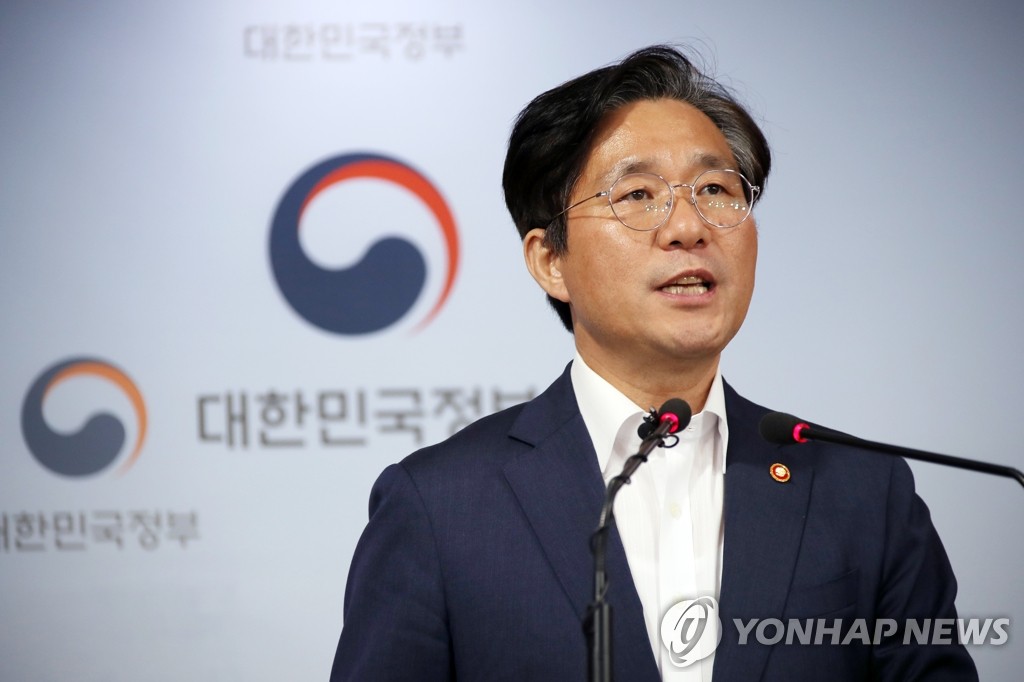South Korea on Tuesday rebutted the possibility that a key Japanese industrial material has been shipped to North Korea in breach of international sanctions against Pyongyang as alleged by Japan.
Tokyo has claimed that its strict regulations of shipments of key materials to South Korea are due in part to Seoul's non-compliance with U.N.-led sanctions on North Korea.

"We have found no evidence of the transfer of hydrogen fluoride imported from Japan to any U.N.-sanctioned countries, including North Korea," Industry Minister Sung Yun-mo said in a hastily arranged press briefing, claiming that local firms are faithfully abiding by related regulations.
The remark came after Japan raised the suspicion that hydrogen fluoride shipped to South Korea was funneled into the North.
Sung said that Japan should share the grounds for such allegations instead of just raising unsubstantiated claims.
"We urge Japan to stop making groundless allegations," Sung added.
Starting last week, the Japanese government applied more complicated procedures for exporting fluorine polyimide, resist and etching gas to South Korea, a move that could adversely affect major local tech giants, such as Samsung and LG Electronics.
Etching gas refers to high-purity hydrogen fluoride.
Fluorine polyimide is used to make flexible organic light-emitting diode displays; resist is a thin layer used to transfer a circuit pattern to a semiconductor substrate; and etching gas is needed in the semiconductor fabrication process.
On Friday, Koichi Hagiuda, a senior member of Japan's ruling Liberal Democratic Party, said the export restriction was prompted by concerns that the etching gas exports could flow into North Korea and could be used to produce chemical weapons.
Sung rebuffed the claim.
"There is no evidence whatsoever that etching gas has been shipped to any countries, including North Korea, that are subject to sanctions under the U.N. Security Council resolution," he said.
The minister added that South Korea is seeking to hold a meeting with Japan on Friday in Tokyo concerning the issue, although details, including participants, have not been decided yet.
Meanwhile, Foreign Minister Kang Kyung-hwa said Tokyo has not yet provided any official explanation or evidence regarding its suspicion of the materials being shipped to the communist North.
"(We) have demanded Japan's explanation but no explanation has yet been provided," she told the National Assembly.
Seoul has also filed a complaint with Japan for the latter's failure to provide any evidence of the suspicions it has raised, Kang added.
Foreign Minister Kang Kyung-hwa (L) speaks in a parliamentary interpellation session at the National Assembly in Seoul on July 9, 2019. (Yonhap)
Japan's strict export regulations came after last year's ruling by the South Korean Supreme Court that ordered Japanese firms to compensate South Korean victims of forced labor during Japan's 1910-45 colonization of the Korean Peninsula.
Japan has lashed out at the ruling, claiming that all reparation issues stemming from its colonial rule were settled under a 1965 government-to-government accord that normalized bilateral relations.
South Korea, whose main export products include semiconductors and smartphones, relied on Japan for more than 90 percent of its supplies of resist and fluorine polyimide and for 44 percent of its etching gas over the January-May period, according to the Korea International Trade Association.
The minister said Japan's move to restrict exports of certain materials is in clear violation of international trade rules as apparent retaliation.
He said the Seoul government has requested the World Trade Organization to discuss the issue immediately.
Early this week, President Moon Jae-in called on Japan to withdraw its export control against South Korea, describing it as an attempt to limit trade for a political purpose.
In case of "actual damages" to South Korean companies, President Moon said there will be no other choice but to take "necessary" measures.
Seoul's foreign ministry on Tuesday repeated its call for diplomatic efforts.
"It isn't good for Korea-Japan relations for both governments to react to each other like this. That's why we called for consultations to prevent this diplomatically and urged Japan to voluntarily retract the measures," ministry spokesman Kim In-chul told a press briefing.
But Japan rejected South Korea's repeated call for talks to resolve the trade row, saying it has no intention of lifting the curbs and the issue is not subject to talks.
Japanese Trade Minister Hiroshige Seko made the remark after a Cabinet meeting earlier in the day, and added the decision was part of efforts to review domestic export controls. (Yonhap)

